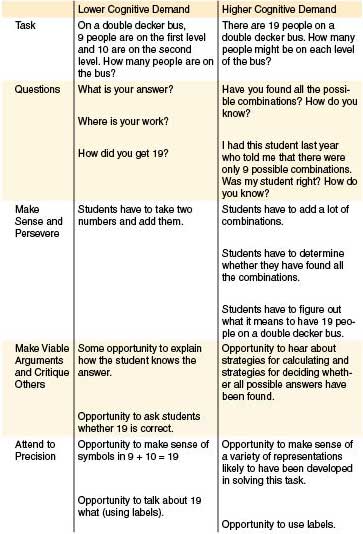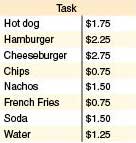By Chandra Hawley Orrill, Posted May 11, 2015 –
We know that to understand how our
students think, we need to ask them good questions. We read all the time about
the importance of questioning and different kinds of questions. But, all questions
are not created equally. In this two-part blog entry, I want to explore the
relationship among asking questions, the problems we use in our classrooms, and
the effects questions and tasks have on our ability to address some of the Common Core’s Standards for Mathematical Practice (CCSSI 2010). Specifically, let’s think
about these Standards of Practice:
SMP 1. Make
sense of problems and persevere in solving them
SMP 6. Construct
viable arguments and critique the reasoning of others.
SMP 3. Attend
to precision.
The goal of this blog post is to
emphasize the point that the tasks you choose to use in your classroom enhance
or inhibit your ability to ask the kinds of questions that allow students to
develop these three Standards for Mathematical Practice (SMPs).
 Tasks Matter
Tasks Matter
The cognitive demand of a task is the
level of cognitive engagement needed to complete the task (Stein et al. 2009).
You could think of a problem that requires only memorization as being at the
low end of cognitive demand, whereas a task that requires students to make
connections between and among mathematical ideas in new ways is a high
cognitive demand task. Research has shown that using high cognitive demand
tasks in ways that support that rigor will lead to increases in student
learning.
Questions Matter
To maintain the level of cognitive demand
written into a question, a teacher must ask good questions. A high cognitive
demand question is one that invites students to explain their thinking, make
new connections, describe their process, or critique other ideas. Questions
that maintain high cognitive demand engage students in making more sense of the
mathematics, whereas questions that lower the cognitive demand focus on correct
answers and correct answer paths.
Standards of Practice Come from Tasks and Questions
One of the challenges of the Common Core
is the need to address the SMPs all the time. We all know that students need to
actually practice the SMPs to develop
the skills and dispositions that are valued. Although forgetting about the SMPs
is easy, they are crucial to students’ development as mathematical thinkers.
For this discussion, I’ve chosen three SMPs to focus on because they are all
closely related to tasks and questions.
• High cognitive
demand tasks require students to make sense of them. Unlike a page of simple
number sentences, high cognitive demand tasks require that students read them,
determine what the question is, and determine how to use the information
provided in the task. Sometimes, this is also true of lower cognitive demand
tasks.
• High cognitive
demand tasks often have multiple ways of finding an answer or multiple correct
answers. When this is true, you and your students have much more to talk about.
And many more student ideas come out in the conversation. All of this offers an
opportunity to make sense of one another’s thinking and for each student to
learn how to communicate about her or his own thinking.
• When
we engage in meaningful discussions of mathematics that feature a lot of
different ideas, it becomes more and more important to be sure everyone in the
room knows exactly what each person is talking about. Precision is developed by
being asked to make sure everyone understands a viewpoint. It comes from the
use of specific mathematical terms, from labeling answers, and from using representations
as tools to support communication about mathematics.
Your Turn
Now it’s your turn to think about the
effects of Tasks, Questions, and Practices. Consider the two tasks below.
1. Decide
which aspects of each task make them of higher or lower cognitive demand. Could
you do anything to raise the cognitive demand of either task?
2. Think
about questions you could ask students as they work on these tasks. Are these
questions raising or lowering the cognitive demand of the task?
3. How
does each task attend to perseverance and sense making?
4. How
does each task promote making viable arguments? What about critiquing the
arguments of others?
5. How
does each task provide students with opportunities to communicate in precise
ways about mathematics?
 Task 1. Lunchroom Problem
Task 1. Lunchroom Problem
Ella
would like to buy lunch in the lunchroom today. Meals cost $2.50. Dessert costs
an extra 75 cents, and milk costs 75 cents. If Ella has $5.00, can she buy
lunch in the lunchroom?
Task 2. Buying Lunch
You are going to the amusement park. At
the amusement park, you will buy lunch. You don’t want to carry coins, only
dollar bills, because coins can fall out of your pocket on the rollercoaster.
You can purchase any of the items on the menu, but you cannot buy more than one
of the same item, and you cannot spend more than $10.00. Using the menu to the
left, find out how many different lunches you could buy without receiving any
change back.
More Reading about Cognitively Demanding Mathematical Tasks
National
Council for Teachers of Mathematics. 2014. Principles
to Action: Ensuring Mathematical Success for All. Reston, VA: National Council
of Teachers of Mathematics.
Common Core State Standards
Initiative. CCSSI. 2010. Common Core State Standards for Mathematics (CCSSM).
Washington, DC: National Governors Association Center for Best Practices and
the Council of Chief State School Officers. http://www.corestandards.org/wp-content/uploads/Math_Standards.pdf
Stein, Mary Kay,
Margaret Schwan Smith, Marjorie A. Henningsen, and Edward A. Silver. 2009. Implementing Standards-Based Mathematics
Instruction: A Casebook For Professional Development, 2nd ed. New York:
Teachers College Press.
 Chandra Hawley Orrill, [email protected], is an associate professor and department chairperson in
STEM Education and Teacher Development at the University of Massachusetts–Dartmouth.
She teaches courses on mathematics content, like proportional reasoning and
number sense, for teachers seeking their professional license as well as
teaching a variety of courses in the Mathematics Education PhD program. Her
interest is in how teachers understand the mathematics they teach and how we
can better support teachers in understanding mathematics. She has conducted
hundreds of hours of professional development focused on standards-based
mathematics and on technology integration in mathematics for elementary school teachers.
Chandra Hawley Orrill, [email protected], is an associate professor and department chairperson in
STEM Education and Teacher Development at the University of Massachusetts–Dartmouth.
She teaches courses on mathematics content, like proportional reasoning and
number sense, for teachers seeking their professional license as well as
teaching a variety of courses in the Mathematics Education PhD program. Her
interest is in how teachers understand the mathematics they teach and how we
can better support teachers in understanding mathematics. She has conducted
hundreds of hours of professional development focused on standards-based
mathematics and on technology integration in mathematics for elementary school teachers.